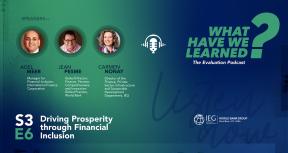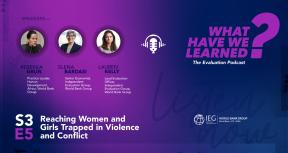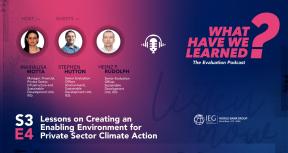Listen on: Apple Podcasts, or Spotify.
Tax revenues are a critical source of financing in every country. Especially with increased debt pressures in the wake of the pandemic, and governments struggling to fund a myriad of demands, from health sector capacity building to climate change action. A country’s tax system is also a reflection of its social contract and priorities.
However, revenue collection lags government needs in developing and emerging economies because of narrow tax bases, large informal sectors, and the often-difficult political economy of tax reform.
On the first episode of this series about taxes, or domestic revenue mobilization, the World Bank’s Director for Governance Global Practice, Arturo Herrera Gutierrez, and IEG host Jeff Chelsky, discuss how the World Bank can most effectively support countries in managing the difficult terrain of tax reform.
TRANSCRIPT
Jeff Chelsky: Good day. I'm Jeff Chelsky, Manager of the Economic Management and Country Programs Unit of the Independent Evaluation Group in the World Bank. And this is, What Have We Learned?, the evaluation podcast.
Today we're going to talk about one of everyone's favorite topics: tax. Or, more broadly, domestic revenue mobilization or DRM. This has become an increasingly important part of international and country level development policy agendas as developing economies face rising needs for development finance.
In 2015, at the International Conference on Financing for development in Addis Ababa, the World Bank was among the multilateral institutions that committed to step up its support for this critical source of financing, pledging to ramp up its engagement with client countries.
In the years since, domestic revenue mobilization has figured prominently in successive of IDA replenishments and World Bank Capital Package commitments. Domestic revenue mobilization has also become even more urgent since the start of the pandemic in the face of growing demands for spending on everything from health sector capacity building to climate change adaptation.
DRM, in the period following the 2015 conference and leading up to the COVID pandemic, was the subject of a recent IEG evaluation. The evaluation confirmed that the World Bank had intensified its attention to domestic revenue mobilization, particularly since 2018 and especially in countries eligible for IDA, the World Bank's fund for the poorest countries. However, results have fallen short of expectations. There has been little to no increase in lending for tax administration capacity building in lower income countries and tax reforms have sometimes proven hard to sustain.
To discuss this topic, my guest is Arturo Herrera, Global Director for the Governance Global Practice at the World Bank. Arturo is a Mexican national and has held several leadership positions at the World Bank in the Latin-America and Caribbean and East Asia-Pacific regions. And between 2018 and 2021, Mr. Herrera served in the government of Mexico as Co-Head of the Finance Team for the presidential transition, Deputy Finance Minister, and most recently as Minister of Finance and Public Credit. Welcome Arturo.
Arturo Herrera: Hi Jeff. Glad to be here.
Jeff Chelsky: Let's start with a general question. Why are tax revenues so important to developing economies?
Arturo Herrera: I would say there are three main reasons why this is so important. The first one is that many of the relevant development tasks like health, education, building water dams, require budget, and that requires countries to raise taxes.
The second reason is that the tax issues reflect to a large extent the social contract in a country. It reflects how much a country is willing to spend, let's say on education, and how much the citizens are willing to pay collectively for that.
And the final reason is that taxes also reflect the extent of the trust in government, and this is very important. A government may have certain tax collection in mind, but if the citizens will not believe in the government, they may be reluctant to pay them. Taxes become an interesting feature because they play several roles as a source of providing resources for the government and signaling the trust in the government and the direction of the commitments of the government.
Jeff Chelsky: Thanks. Now, with that as a backdrop, can you talk about the significance of the 2015 conference on financing for development in Addis Ababa and the nature of the commitments that the international community and the World Bank made at that conference?
Arturo Herrera: There are a few interesting results from the Addis Ababa meeting. For the first time it was recognized that there's a minimum tax collection figure below which the state is probably not functional. And the level was set up at 15% of GDP. Now let's be clear, 15% of GDP is not the objective, it’s a low bar. And the idea is that below that figure a government will be incapable of providing basic services, minimum education, minimum health, security.
Jeff Chelsky: For low- and middle-income countries, that tax to GDP ratio has been on a declining trend over the decade prior to the COVID pandemic. What do you consider were the major factors driving this negative trend? This is in effect the exact opposite of what we would've hoped would've happened. Why did the commitments in Addis Ababa in 2015 not change the trajectory for developing economies?
Arturo Herrera
First of all, it is such a short period now from Addis Ababa to now. Particularly if we consider that we have COVID right in the middle of it. COVID was really a huge shock and many countries responded by providing tax breaks to citizens and to businesses. So just imagine a restaurant that is closing because isolation measures, then the government respond by giving a tax break on the income tax. So it is expected that the collection will lower.
The second thing is that tax is a complex issue and there are two basic components that we recognize at the World Bank. One is the tax policy, which is managed by my colleagues and the Macroeconomics, Trade and Investment group, the macro group. And that, if it's allowed, has the largest and most immediate impact. Let's assume you have a country which has a value added tax rate of 10%, if you move it to 13%, which just require an approval in Congress, it may be complicated, but it’s immediately done. But things that are about more the institutional aspects, about getting better at collecting taxes, strengthening the tax administrations, that takes time. You need to build the capacity and you need to train people; you need to audit their firms to do that.
Jeff Chelsky: Now, in IEG's recent evaluation IEG noted that the World Bank intensified its support to developing economies for domestic revenue mobilization, especially after 2018 with the establishment of the global tax program, a large multi-donor trust fund. What do you consider having been the World Bank's major accomplishments on the tax front and what challenges still need to be tackled?
Arturo Herrera: There are several issues which are relevant. One, which is very interesting on the analytical side, is recognizing that there are ways to make comparisons across countries in a cheaper and simpler way. Last year we launched a tax administration index, which allows us to identify the level of development of tax administration using third party sources. And that serves as a map, a roadmap for reform on tax administration.
We are about to launch a tax administration handbook, which we expect will be some sort of bible, the kind of book that you expect a tax administration will have behind their desk. Now, that's one of the things that we have been doing on the analytical side. But we also have been working very, very strongly on specific country projects, and those tend to take time. Sometimes it depends on the problem, it's about the whole system, reorganizing the administration, putting together the customs with the internal revenue administrations.
Jeff Chelsky: Now, as you said, during COVID there was a lot of change in tax policies, tax exemptions. Coming out of COVID, what is the World Bank's strategy to support the mobilization of tax revenue in developing economies?
Arturo Herrera: First of all, the world after COVID is different than the world before COVID. The way I used to put it is that it's not an impasse, it's not that you have this shock in 2020 and then you go back to 2019. Financing the fight against a pandemic requires building hospitals, buying vaccines, hiring doctors, hiring nurses. So, there's a clear understanding now that the states require more resources than before the pandemic. And that's on top of the Addis Ababa agreement.
There are certain agreements at the global agenda, where the World Bank has been a key player, that are demanding different resources from countries. For example, there's an agreement that we must tackle climate change. And tackling climate change in a serious way requires resources, budget, and that requires, obviously, revenues and taxation.
There's an agreement, as a lesson from COVID, that we have to prepare for a pandemic and that's going to require resources. Each of these things require more resources, more resources. So what we see is countries that are much more willing to engage seriously.
Now there's another aspect which is more a macro aspect, if you think about the macro shock from the pandemic. What you have during the pandemic is the reduction in the economic activity and at the same time an increase on the expenses of a government. So that means that debt over GDP ratio was increased. So, you have these needs, and you have a much more complicated debt situation. So, all of them are calling for more resources on a constant basis.
Jeff Chelsky: You're singing my favorite tune. As you know, IEG has done several evaluations in the debt space, but don't worry, I won't raise any of those issues here. Now, IEG's evaluation pointed out that in several countries, tax reforms, particularly those supported by the World Bank and with respect to tax exemptions, were frequently reversed and often proved very hard to sustain because of vested interests. Is this consistent with your experience? Is this a problem that the World Bank should be aware of? And is this something that we can do something about to ensure that tax reforms are more sustainable?
Arturo Herrera: We always learn from the projects, and it's not bad that these things have happened, it's bad if we don't learn from them. And that's the role of IEG, on helping us to point them out.
There are three things that we could do: the first one is to really try to have a better assessment about the wide support for these kinds of reforms. This is an area in which there are multiple stakeholders. Obviously, the ministries of finance want to collect more, but then there are also the politicians. If you are close to an election, the appetite to have some of these measures is different than if they are not close to the election. And then you mentioned the issue related to vested interests.
The second thing is particular to some of our policy lending projects, we need to fine tune them to pick up things that are much more difficult to reverse. For example, things that are approved through a decree are legally easier to reverse than things that are approved at a law level or a constitutional level.
And finally, and this is something which is closer to what we do and is very interesting, some of the larger bodies of government are the ones related to tax administration. For example, close to 120,000 people work for the Internal Revenue Service (IRS) in the US. In my own country, and I led that group, they were close to 35,000 people. And several years ago in China there were 800,000 people who worked in the tax unit. So, once some of these reforms are incorporated institutionally, they become very difficult to reverse. Because then the institution, the people who work on the tax collection make them their own, they start procedures and process to collect it. But we need to allow that time so that the reforms play out and they become part of their daily life.
Jeff Chelsky: Your point about pursuing mechanisms that are more difficult to reverse is similar to the finding of the IEG evaluation, which noted that simply limiting tax exemptions, that's very easy to reverse, but changing the framework for putting them in place in the first place, more transparency, more legislative oversight was one of the ways that the bank could have impact.
Arturo Herrera: If I may-
Jeff Chelsky: Oh, yes.
Arturo Herrera: ... because you mentioned that, that's very interesting because there's this famous economist that we invited a few months ago here to present his latest book. Alan Blinder is a professor of economics at Princeton, he was the Chief of Council of Economic Advisors of President Clinton and then he was the Vice-Chairman at the US Federal Reserve. He has a book about economic policy where he narrates how during the Clinton days, they introduced something that is called a fiscal balance rule at the margin. What does that mean? That means that if at some point someone wants an extra expenditure, they have to have an extra revenue. And to put it in the opposite way, if at some point someone want to have an exemption, they have to either add a revenue or reduce the expenditure.
Jeff Chelsky: Ultimately it comes down to governance frameworks to begin with.
Arturo Herrera: Yeah.
Jeff Chelsky: Let's talk a little bit about what works in helping developing economies raise tax revenues. Much of the support to DRM in lower income countries has been delivered through budget support operations, policy-based lending. Could you speak to the value of this tool as a vehicle for supporting domestic revenue mobilization?
Arturo Herrera: I think policy-based operations are a really important tool. And it's important in the sense that it changes the structure of the tax code. Now, something that we have been becoming aware of, and this is where we have to be careful about how we choose the instrument of engagement, is to have clarity as to what is the problem we are trying to address. I'll remember for example around 13 years ago when we were trying to work with a Peruvian tax administration authority. At the time, the IT system was so complicated that it had 300 subsystems. And they were telling us that each day they were just trying to make sure that it would survive one more day. So clearly the problem for Peru at the time, I don't know what is the status right now, was trying to work hard on that. And ideally what would have been the best engagement for the Bank, was to have some sort of a system modernization project. So, all these tools have proven to be good, but my preference is to tailor the tool to the specific project or challenge that the government have.
Jeff Chelsky: Interesting, because the evaluation found that since Addis Ababa, there'd actually been a shift to using budget support operations to push for domestic revenue mobilization and less attention on the investment project side.
Now, another of the findings of the IEG evaluation was that there had been little increase in bank support to build tax administration capacity in low-income countries. This seems surprising. Given the commitments in Addis, I would've expected an intensification of efforts, particularly given that many low-income countries have tax to GDP ratios below 15%. Why have we not seen more activity or attention to this sort of bank support in low-income countries?
Arturo Herrera: So the question is what we could do better in that. And I think that one of things that is going to be really helpful is this new tax administration index. These things have proven to be really successful in the past. A tax administration index, it doesn't help any reform. It's just a picture of where you are right now. But there's a very interesting behavior among countries: they immediately start looking to their peers and see how they look in the picture. So, if a Sub-Saharan country has a certain index, they are not going to look to where is Denmark or where is the UK, but they're going to look to where is their neighbor. And if they realize that they are in a better shape than them, they immediately reach out for support. So that's one of the things that is probably is going to be helpful.
Jeff Chelsky
I can see how the tax administration index you're talking about might help generate demand. But is this an issue that many of the countries themselves don't demand the capacity building support for tax administration?
Arturo Herrera: Actually, on the one hand, because we are in a privileged position, we see how many tax administration units perform across the world, but if you put yourself in the shoes of someone in a country, they only have one experience: their own. And for sure they know better than us on how their tax department works. For them it's very difficult to mind how to do things better because they are the experts. So it requires a little bit of convincing.
Having said so, I think that building demand for tax administration is easier because it's less politically tricky than, for example, changing the rates. Twice in my career I have had bosses which say: "I'm not going to increase taxes, but go ahead and collect the ones that have been authorized." Because once you increase taxes, people immediately complain. On the other hand, if you go and collect the taxes that are already authorized, it's basically clamping out on evaders and people don't like evaders. If most of the citizens pay their taxes, they don't like evaders. If most of the people are evading taxes, then you have also political problem. But I think there's a little bit less of political resistance to improve the tax administration units. Now, it takes time. So really you need to invest it. It's not going to have immediate effects.
Jeff Chelsky: I love that answer. Now, at the same time as the World Bank is being asked to support increased domestic revenue mobilization, it's being asked to support more progressive tax systems. IEG has argued that progressivity should be assessed at the level of the overall fiscal system allowing targeted spending to offset the impact of taxes. How do you view the Bank's mandate to promote progressive tax systems and how is this best accomplished?
Arturo Herrera: I think there has been a lot of progress over the last few years about understanding how these things have to be evaluated by the overall fiscal impact. And I'm going to give you two examples. Typically, value added taxes let's say on the demand of food or certain kind of things, are supposed to be regressive. But the point is not whether the tax is regressive by itself. If you collect a $100 million dollars on value added tax and you devote it to finance primary education in the poorest zone of a country, that overall thing is progressive.
At the same time, it was also something that was evaluated by the Obama administration, when they were raising the excess taxes. They were basically raising the tax on cigarettes. And people said, okay, people are addicted, so they're not going to reduce it, you're basically taxing the poor more than the taxing the rich. But they were able to calculate how the reduction on the consumption was actually saving on the long-term health related expenditures. So that's the way in which these policies need to be analyzed. It's not the immediate impact that is most relevant, but is the overall impact, either through time or through the expenses during the fiscal year.
Jeff Chelsky: Indeed, IEG found that perhaps one of the best examples of World Bank impact has been in the area of tobacco taxes and the tobacco control program. Last question, where do you see the greatest potential for the World Bank to increase its impact in supporting developing economies to raise their own tax revenue?
Arturo Herrera: First of all, I would say it's in the environment. One of the things that changed after COVID is this idea that government is required to do more things and they cannot. They cannot do more things with the same resources. But there's another aspect, something that was approved two years ago: the global minimum tax. And what was happening here is that the economy has been changing over the last decades and the tax codes were designed with tangible goods in mind.
Imagine you're going to watch a film, you're going to buy a ticket there. The company who owns that theater is going to have to pay taxes. But imagine now you are watching the same film on a platform. So where is that transaction happening? Imagine someone is watching that film in Mexico using Netflix: where is the transaction happening? It's happening in California where Netflix headquarters are. Is it happening where the servers are, which probably are somewhere in Panama, or is happening in Mexico? And that was creating a very difficult process of taxation digital goods. So one of the things that was approved, was to have this global minimum tax, but that's a technical complex aspect. And the Bank could help countries to implement this. So, the table is set up for that: the environment, because more commitments will require more resources, but also because there are additional things like the global minimum tax are naturally going to require efforts from the country and we should be ready to help them.
Jeff Chelsky:I want to thank you. This has been hugely informative for me, and I really appreciate you taking the time out of your busy schedule to talk to us. I'm Jeff Chelsky, this is Arturo Herrera, my guest, and this has been IEG'S evaluation podcast, What Have We Learned? Thank you very much. Have a great day.
Arturo Herrera: Thank you.
This Episode’s Featured Guests:








